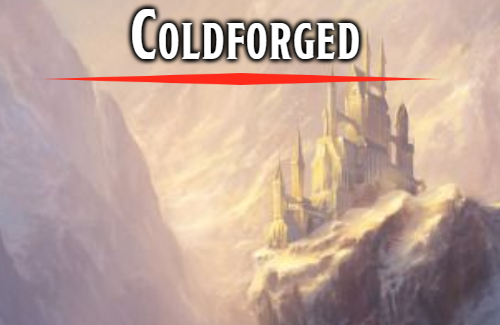From the Ground Up – Humans and Humanoids

This is the last article in section II, the natural world, and to me its the natural endpoint of a section focused on putting the finishing touches on a strong foundation of natural geology, flora and fauna. There are few things so natural, and so continuously unnatural, as those intelligent humans and humanoids that so invariably populate the worlds we explore.
Making a Home
One of the things that makes people (here, i’ll use people to refer to any of the intelligent humanoid races, its just easier this way) successful, is that they are not tied to any specific climate, local or food source. Unlike many of the previously discussed beings, this means that we can speak more about what people need from a home than where they need that home to be. While there will always be a stereotypical habitat for many of the peoples in a given world, they need not be applied because they are beings of fantasy who we can adapt to what we need of them.
Settlements, the places where people live, are very much a unique product when compared to ones that the creatures of the rest of the world are likely to create. Each one is an unnatural area sculpted to meet the specific demands of its inhabitants, most often with little regard to the natural world around it. These towns, along with the roads and outlying buildings, create situational scars on the land which it is placed.
Most settlements, regardless of race, tend to crop up along water ways as they are the best routes to and from many locations. They then spread to more defended, luscious, and desirable locales. Settlements will also crop up near necessary natural resources for the times they are portraying, most notably lumber, iron ore, gold, silver and victuals. These settlements not only act as hubs for the people that live inside of them, but also for the multitude of creatures that benefit simply from the towns existence.
The inhabited area around a settlement or city is likely to be populated with less dangerous animals and creatures. If the humanoids are sufficiently powerful, they will do everything they can to ensure the safety of the people within the town and those that are traveling to and from it. They will chase off deadly predators, or simply hunt them down in their lairs, causing the prey creatures to explode in population, now that the factors keeping them in check has been nullified. Large animals, especially slow ones, but often simply any large creature, will also be chased off the area around a settlement because they are active nuisances, causing damage and destruction to property, which is something that many a wealthy land owner cannot abide.
Finally, around these settlements, will be the intelligent outcasts. Creatures, often people, who are smart enough to know that they aren’t wanted, but are also cunning enough to learn to evade capture. These creatures often termed briggands, bandits or raiders, will often prove extremely difficult to catch, eliminate or destroy. There are always people who seek to live on the edge of civilization and still benefit from it. If the area is especially rich and prosperous, you may be in for a visit from your neighbors.
Won’t You be my Neighbor
With their own land squared away, safe and secure from the monsters of the night, the forest, the sewers and the sky, there is only one thing for a population to do: expand. During the historical periods that these adventures are often set, there is little unclaimed land lying about. Kings and monarchs of all stripes claim the entirety of the country, gifting parcels to noble families and knightly warriors – or their equivalent in other cultural models. This leaves young noble sons and intrepid middle class and poor only one real way of improving their lot in life: Warfare.
The tensions between two countries in the modern area rarely spill into open violence and warfare. Trade agreements, economic agendas and powerful populations who don’t wish to risk the lives of others at home make wars a difficult task to start. In earlier times, this just wasn’t the case. War, up even until the start of the 20th century, was considered a valid and completely acceptable strategy at getting what you wanted. Backing those stances up were the deeply held religious beliefs of both the king and the population instilling a sense of rightness about their actions and a common thought that the only way a country could survive and prosper was to secure the natural resources and populations within its own borders and you had a very dangerous situation on your hands. Nearly anything could lead to war, and did. nations and peoples had long and storied histories of violence against each other, creating deep rivalries and even hatreds between people with very few differences.
Make sure to take these differences into account when populating the world. Two nations, not matter how close now, are likely to never have fought a war if they share a border. Make note of where the natural resources are along the border, and close to it, so that you understand where and how many of the incursions could and would have taken place. Think about how each of the nations view the other, and remember the same information when it comes to monster consistency – two populations that are at odds with each other have to balance their strengths and weaknesses. If one people is immune to fire, and the other are masters of fire magic, it throws the whole thought process awry. Those who are fire immune would quickly have overrun those who use fire, subjugating them to their might. Its not a pretty story, but it is one that often unfolded.
Forms of Rule
Each group of people is largely concerned with how they are staying alive – their settlements and homes – and who is trying to kill them – their neighbors. Once they have that down and out of the way, they will worry about governing and government. While there will be a whole article on government later, this segment is more looking at the larger, broader picture. Everything being in a current state of stability and well being, the people will be shaped by what type of government they are lead by. Monarchies, the most common, will generally last a hundred to a hundred and fifty years or so in the most extreme cases, before falling afoul of turmoil and strife. How and they come out the other side, and why the winning side emerged victorious shapes the peoples views on the world. Its not hard to envision disillusionment with the government if many people were needlessly killed (read: not soldiers), and then taxes imposed to pay for the war, and their fief given over to a new lord now that their old one is slain, who is much worse.
on the reverse side, there will be much rejoicing in a quickly won campaign against a hated rival that results in tax holidays, feast days and an influx of goods from the other countries, with their lord coming back a sated, pleasant leader who leaves everyone alone.
I hope you took something from this look at how people settle and exist where they do in a fantasy world, and if it didn’t help, drop me a line, let me know what i could do to improve it!


